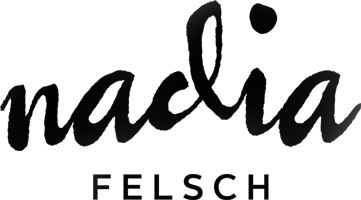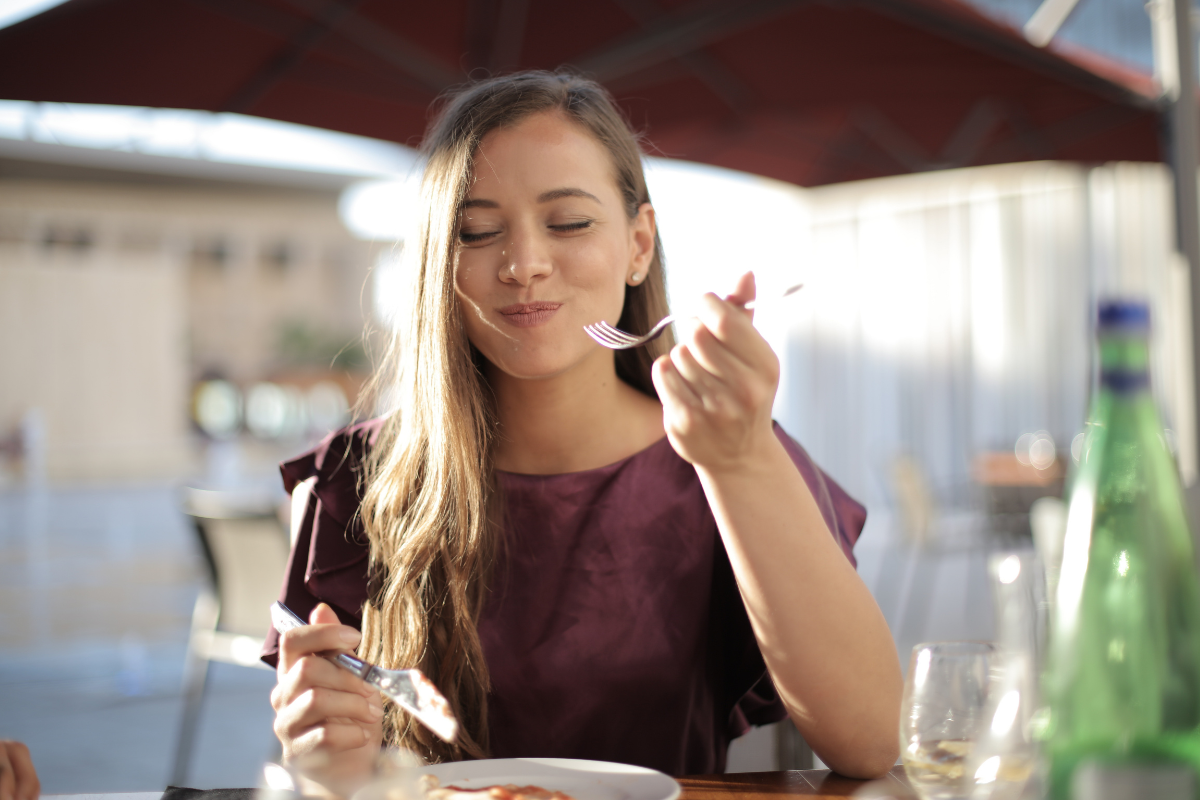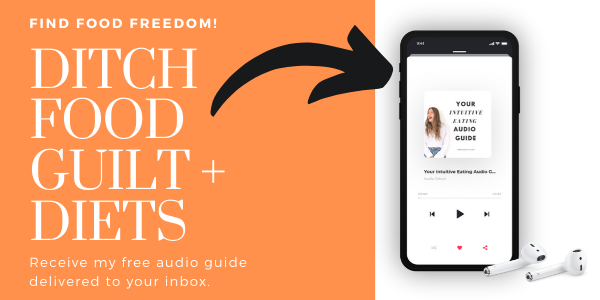Introduction
Feeling better from the food you eat is part deconstructing and unpacking what you’ve been taught about food and eating (the relationship you have) and part exploring new ideas from a practical approach.
This episode explores:
- the most critical element of non-diet nutrition
- the most common obstacles that prevent that happening
- practical invitations to begin feeling better from the food you eat
Resources mentioned:
- Non-Diet Nutrition 101 Free MasterClass - October 18th 12pm AEDT
- Nadia's Food Freedom Guide
- The Food and Body Freedom Facebook community
- Transcript of this episode below
Hello hello, hello, I am thrilled to be with you today. Thank you for joining me whether this is the 50th episode of this podcast that you've listened to, which is, by the way, the number of this episode, I can't believe it. It could be your eighth it could be your first I want to welcome you and I want to say thank you the ideas that I deconstruct that I unpack in this podcast and also the learning that I offer you. I'm very conscious that they are not the the well they're not yet the norm. Thanks to diet culture, thanks to fatphobia thanks to white supremacy, culture and all of the isms. So here are two ways that you can help that change. And the first is to rate review and subscribe to the show. Thank you. And the second is to share this this show this episode an episode that's your favourite with someone in your life who you think would really benefit from hearing the message. So if you're new around here, or if you have been here 50 times before I am Nadia Felsch. I'm an anti diet nutritionist and I'm an intuitive eating counsellor. And in this podcast, we explore the practical aspects of leaving the diet mentality behind and finding your own food and body freedom. And in this episode, today, I'm going to be exploring how to feel better from the food that you eat. Love that I think it's so important. It's one of my favourite topics. And this is actually going to be part of a two part focus because there's a lot and I really want to spotlight the different aspects here. So this is part one, and this part is going to be you know, in part, deconstructing and unpacking what you have been taught about food and eating. So let's call that the relationship you have to food. And it's also going to be part invitation for you to explore these ideas, so that you can learn them in a more practical sense. So part deconstructing part. Let's do the practical stuff. And I'm going to have an end of the episode really specific invitation of action for you. So be sure to stay listening for that and in this episode to be honest, you're probably going to want to take notes. So as always, if you are walking if you are driving, maybe that's not accessible to you just have a look at the timestamp and come back to it. So in this part one, this first part of the series of feeling better from the food you ate, I'm going to cover the most critical element of non diet nutrition. And I'm also going to explore two of the most common obstacles that I guess I commonly see that prevent that from happening. So the most critical element of non diet nutrition which is part of feeling better for food, and then the obstacles that I see preventing that from happening. So drumroll, the most critical element the most fundamental thing to know about nutrition is enough. Eating Enough. This has to be the priority when we are talking about nutrition. Nutrition really at the core sense just means food, the bits and pieces that our body requires from food and so therefore the most just integral, important imperative, all of the words. The most important thing is that there is enough and really untruly The what matters really nowhere near as much if there isn't enough to begin with. And this is also about consistently getting enough for the most part, we are human. So you know that feeling when you're sick. This This happens to all of us, you know you have a low appetite, and then maybe days later when you feel better. I hope your appetite increases. You know, this is a really normal process that happens in our body in response to inadequate nutrition. And it also happens regularly when we are not eating enough regularly or we don't eat at consistent periods. Now this isn't this isn't all as laid out when you feel better, I hope your app is regularly or we don't eat at consistent periods. And I think what's so sucky about this again, thanks, diet culture thinks all of the systems that are holding this need that we have this very fundamental need is not something we actually tend to identify with or that we're familiar with even feeling and noticing. So here is a check in for you because I get that that might be where you're at. Eating Enough is going to look in a really basic sense, like eating every two to six hours. And that's to keep our blood sugar pretty regulated. Now I also acknowledge that a big window of time. Is that two hours not here. Is that three hours, is it five hours. Of course I can't tell you that. You're not my client. We're not sitting in a room where that's appropriate to be shared. This is a guide. This is a generalisation. And I also honour that you might need more than that, but it's it's in a very basic sense two to six hours that we need to be eating. And we also need you know another way we can think about eating enough is are we eating until we are comfortably full and satisfied. And then a way that we can do a check in there and I talked about this on the pod before is are we stopping seeking food? Is there enough? Are we are we kind of like cool now I get on to the next thing in my life. That would be the idea. That's really a basic sense of what's necessary from the food that we eat. And so I guess the invitation is here to notice what what is your eating pattern like? How does it feel when I talk about two to six hours? How does that land is that quite confronting and I also want to acknowledge that there is nothing wrong with using a timeframe or a structure, whether that's in the beginning, whether that's as a check in and also it might be because your neurodivergence can make attunement to our body connections and sensations it can make that complex. So that's really the fundamental aspect of nutrition that we just want to skip over because diet culture and all the isms. You know, it's inconvenient to think that the answer is actually that that is the core thing to address and it's the core thing I addressed with every single client. So now let's look at really what are those main obstacles to getting in the way of that because chances are that that might be where you're at. And I guess the key aspect here to begin with is neutrality. So why can't you just eat what you want every two to six hours? Because that sounds pretty simple. And I honour that it might not be that for you. So why can't you do that? And is it because you have a story about what you want is bad for you. So I want to pose another question, how is the pursuit of good working? So if you feel that your choices are bad, and what you're doing is bad and all these foods are bad or most of these foods are bad. How is the pursuit of good working out because often what happens is that pursuit is pushing us further and further away from where we want to be. Our relationship to food essentially and all the things we've learned about eating, it's biting us in the ass. It is the thing that prevents us actually from feeling good from the food we eat and maybe there's ideals we're trying to fit into about how we eat. Maybe there's a vision of what our shopping you know supermarket grocery carts should look like or what our fridge should look like or what our pantry should look like. What our plate should look like, what our bodies should look like, of course, and then there are meals that maybe are foods that we feel a lot of pressure to eat. Maybe we rebel against that. No one's going to tell me what to do, even though we're telling us what to do. Diet, culture, all of it. It's all noise. It's all what we've learned. And there might also be a lot of guilt that comes with your choices. So actually, what's getting in the way of regular eating of what you want is your relationship to food. Because if we don't feel neutral to make those decisions, we need to look at the relationship. But there's also another part to this that's interrelated and this is the second obstacle and this is reality. Literally, I call it reality test. What choices easy for you to make what choice is convenient, what choice is preferable? Can you even start there? You might not end up there that might not be what you always eat every day. But could you just start somewhere and again, I want to honour the interrelationship here of the ideals and the guilt that we have drives what we think we are meant to do, what we think is bad what we don't end up doing, and also fundamentally for most humans that I work with, at the very beginning, certainly not as we keep working together, there might well be a lack of critical human care. And that might end up that food choices are the very last thing you think about in the worst possible time. But without eating enough our body which yes includes our brain is stressed. We're in a chaotic state, we're more likely to make decisions that are kind of more like, Hey, this is the best I can do. Which I want to be this is a judgement free place. That's okay. And it's possibly what feels crappy to you. And this is the thing if you like come back come back. This is this is a gym right here. diet culture teaches us to focus on the food or the food choice as the cause of the issue. Right. So it's, it's very rarely that that's what's really going on or at least that that's the only thing going on or that that's the beginning of what's going on. So let me kind of paint you a story here with something I hear really frequently is, I'm always looking for food. Okay, that's a big sign you're probably not satisfied or eating enough or both. I'm eating too much. And that often goes with I'm always looking for food. So again, can you see that trend that there is very likely, at least an a reasonable expectation that we could look at, is there enough to begin with and is there enough satisfaction to begin with, but what we've learned to focus on is I'm eating too much and I'm making the wrong choices. But that is happening for a reason. So your invitation after this episode today, maybe right now is to eat what you want. And right now in this moment, if you can, can you just take a deep breath and take note mentally, digitally physically taken note of what that invitation brought up for you? Do you feel fear? Do you feel worried? Do you feel excitement? Maybe a combination. So when you eat what you want to do, I'd invite you to pay attention to how you feel. What the story that you have is about the food about how you're eating and notice if that takes you away from your body. And if not what body information is there to notice there's going to be a lot and we will be diving more into that juicy data in the next episode. Until then, and to learn how you can feel more supported by the food you eat in a non diety way I have the perfect ideal free class for you. Non diet nutrition one to one I cannot wait to share this class with you. I have never done a class like this. I will be sharing my four non diet nutrition fundamentals that I teach inside all of my programmes and hate you love the first one in this episode. The masterclass is on October 18. The registration link is on my website and in as well the description of this episode on the podcast player you're currently using so you could just click straight through. I really hope you'll join us it's going to be brilliant. There's already so many brilliant people inside which I'm really grateful and excited about. For all of the links and notes from this episode. You can head to my website which is Nadia felsch.com forward slash podcast. Thank you so much for joining me I'm gonna see you next time.


